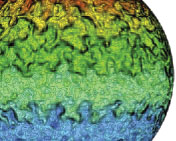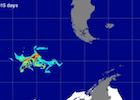Research Overview
My research is directed at understanding the cause of the general circulation of the oceans, its interaction with the atmosphere and its role in the global climate and climate change. Through the use of analytical, numerical and, on occasion, laboratory models, I illustrate ideas and test them out in the light of observations.
Approach
I strive to make my research directly applicable to natural phenomena. In this sense it is very applied. Real physical problems, such as the ones we are challenged by in meteorology and oceanography, can seldom be solved exactly. Instead, my work is directed at understanding, in broad terms, how the component parts of the general circulation work together. This often involves studying key mechanisms and phenomena in great detail, but it is the holistic nature of the science that fascinates me. I work on the premise that, despite seeming complication, the observed facts can be ordered by theory in a simple way. The mathematical and numerical experiments I construct are purposefully transparent and uncomplicated, carefully designed to illustrate how a particular process works. My research papers have a strong pedagogical nature and are always focused directly on the problem at hand. Finally, I attack problems on all fronts and use theory, observations, laboratory experiments, numerical experiments and, if required, organize large field programs.
Themes
My research focuses on important, and usually difficult, problems of the ocean circulation involving interactions between motions on different scales. I approach these problems using observations, theory, laboratory experiments, and new innovative approaches to global ocean and climate modeling pioneered by my group (the MITgcm).
Key research themes are:
- Ocean Dynamics and particularly understanding interactions across scales from those of convection, through the mesoscale up to the global scale circulation.
- Climate Dynamics and the role of the ocean in setting the climate of the planet.
- Climate modeling.
I have helped organize and/or led a number of large oceanographic field experiments including:
- The Labrador Sea Experiment (1996-1997) focusing on open ocean deep convection, see [42]
- CLIMODE (2005-2008) observing the cycle of convection and restratification over the Gulf Stream [111]
- DIMES (2009-2012), the Diapycnal and Isopycnal Mixing Experiment in the Southern Ocean [see oceans@mit story ]
Over recent years, my research has increasingly focused on the role of the ocean in climate and climate change, the dynamics of aqua-planets, and the coupled atmosphere-ocean-ice problem.
Finally, my group has made many algorithmic contributions to climate modeling and particularly ocean modeling through the development of MITgcm and am part of the CliMA project which is bringing AI to climate modeling. I also collaborate closely with the Goddard Institute for Space Studies of Columbia University where I advise on the representation of the ocean in the GISS coupled climate model.




